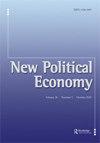Towards a sociology of state investment funds? sovereign wealth funds and state-business relations in Saudi Arabia
IF 3.8
2区 经济学
Q1 ECONOMICS
引用次数: 0
Abstract
ABSTRACT While sovereign wealth funds (SWFs) are making significant incursions into global financial markets, various countries are increasingly establishing funds geared towards national development. Saudi Arabia’s Public Investment Fund (PIF) is the fastest-growing SWF, with most of its assets deployed domestically. Beyond restructuring the economy, deploying the PIF intrinsically implies balancing political and business interests. Yet, there has been little reflection on how socio-political relations with socioeconomic actors shape sovereign wealth allocation. Who gets access to SWF resources, and how? What kind of power relations are maintained or established in the process of SWF development? This article unpacks PIF activities to argue for a microfoundation of how domestic politics influence SWF decision-making. To do so, I introduce a sociology of SWFs using the tools of social network analysis. I find that the PIF mainly targets companies linked to family-owned conglomerates connected to merchant elites with long-standing personal connections to the Saudi state. This article contributes to rentier state debates and broader political economy scholarship by showing how beyond decision-making and asset allocation models, state investment funds also hinge on ancillary networks of social institutions, often generated from ingrained formal and informal interactions between states and society.走向国家投资基金的社会学?沙特阿拉伯的主权财富基金和国有企业关系
摘要在主权财富基金大举进入全球金融市场的同时,各国也在越来越多地建立面向国家发展的基金。沙特阿拉伯的公共投资基金(PIF)是增长最快的主权财富基金,其大部分资产都部署在国内。除了重组经济,部署PIF本质上意味着平衡政治和商业利益。然而,很少有人反思与社会经济行为者的社会政治关系如何影响主权财富分配。谁可以获得主权财富基金的资源,如何获得?在主权财富基金的发展过程中,维持或建立了什么样的权力关系?本文对PIF活动进行了剖析,为国内政治如何影响主权财富基金决策提供了微观基础。为此,我介绍了一个使用社会网络分析工具的主权财富基金社会学。我发现PIF主要针对与家族企业有关联的公司,这些企业与与与沙特政府有长期个人关系的商业精英有关联。这篇文章展示了除了决策和资产配置模式之外,国家投资基金还依赖于社会机构的辅助网络,这些网络往往是由国家和社会之间根深蒂固的正式和非正式互动产生的,从而为更为寻租的国家辩论和更广泛的政治经济学研究做出了贡献。
本文章由计算机程序翻译,如有差异,请以英文原文为准。
求助全文
约1分钟内获得全文
求助全文
来源期刊

New Political Economy
Multiple-
CiteScore
10.10
自引率
9.50%
发文量
41
期刊介绍:
New Political Economy aims to create a forum for work which combines the breadth of vision which characterised the classical political economy of the nineteenth century with the analytical advances of twentieth century social science. It seeks to represent the terrain of political economy scholarship across different disciplines, emphasising original and innovative work which explores new approaches and methodologies, and addresses core debates and issues of historical and contemporary relevance.
 求助内容:
求助内容: 应助结果提醒方式:
应助结果提醒方式:


